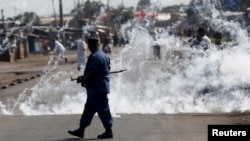As African leaders meet in Johannesburg this week for the twice-yearly African Union summit, they have a big question before them: How do you solve a problem like Burundi?
The tiny central African nation has been beset by political violence over the decision by President Pierre Nkurunziza to run for a third term - despite the fact that the constitution limits him to two.
Analysts say he's not the only central African leader trying to hang on to power in the face of term limits and criticism both at home and abroad.
His decision spurred a failed coup attempt, multiple violent protests and the worst crisis the nation has seen since the end of its brutal civil war in 2006.
Jeggan Grey-Johnson of the Open Society Foundation watchdog group says at this point, Nkurunziza’s back is against a wall - and that everyone saw this coming.
“The situation in Burundi has been one of a train smash in slow motion. Everybody knew that we were going to get to this level. As far back as perhaps November, it was obvious that the current head of state was actually eyeing a third term. It was obvious that nothing was going to stop him.… Now we’ve gotten to a point where he is stuck and so is the rest of the African continent in dealing with this particular problem, between a rock and a hard place,” says Grey-Johnson.
And he’s not the only African leader in this position, says analyst Stephanie Wolters of the Institute for Security Studies. Two of Nkurunziza’s counterparts, the presidents of the Democratic Republic of Congo and the smaller Republic of Congo, currently appear to be trying to extend their terms as well.
Wolters says this worrying trend puts more pressure on the African Union to act on Burundi. She is among many analysts who predict that such actions could lead to future conflict.
“I think that it’s a very emotional issue, people feel very strongly about this because what we’re seeing actually is a reversal. These presidents are essentially turning their backs on those peace agreements, on the gains that have been made,” says Wolters.
Analyst Yolande Bouka of the Institute for Security Studies says the AU’s reaction has been clear and that AU chairwoman Nkosazana Dlamini-Zuma has articulated the AU’s position well. But, she says more action needs to be taken before the situation gets worse in Burundi.
“They’ve said pretty much what I think they should have said. Dlamini-Zuma was very clear about thinking that the third mandate was a bad decision. It’s a bad decision not only for Burundi’s consolidation of democracy but for the region in general, it brings instability,” says Bouka.
So what should the AU do about a problem like Burundi and possibly other African nations in coming years? Grey-Johnson says they need to be firm and hold people responsible for any crimes committed.
“There needs to be a strong statement put out there to hold the president responsible, Nkurunziza, responsible, for anything that goes wrong pertaining to his third term bid. Because ultimately he is the main protagonist in this whole drama. If it wasn’t for his ambition to go for a third term, we wouldn’t be in this situation, that’s obvious to everybody," says Grey-Johnson.
But that could be a hard pill to swallow for the African Union, which is often criticized for closing its ranks and protecting its own.
AU leaders begin meeting in Johannesburg on Saturday. Nkurunziza is not expected to be among them -- but he is sure to be the talk of the summit.




